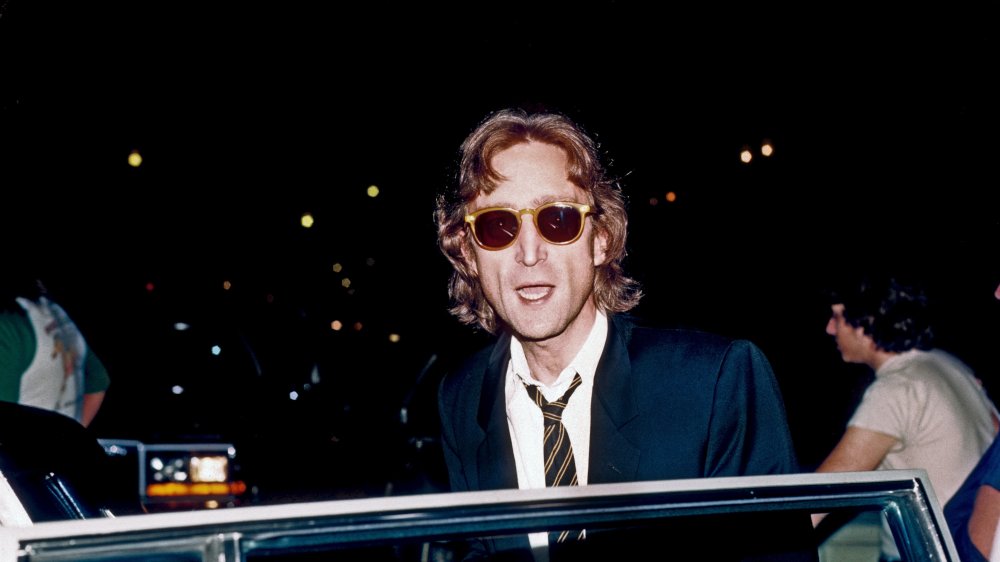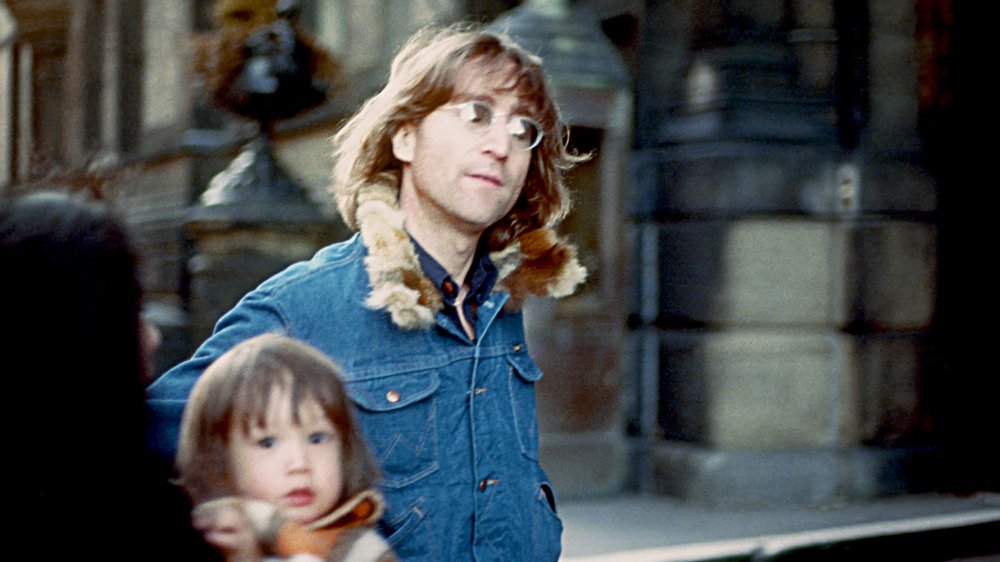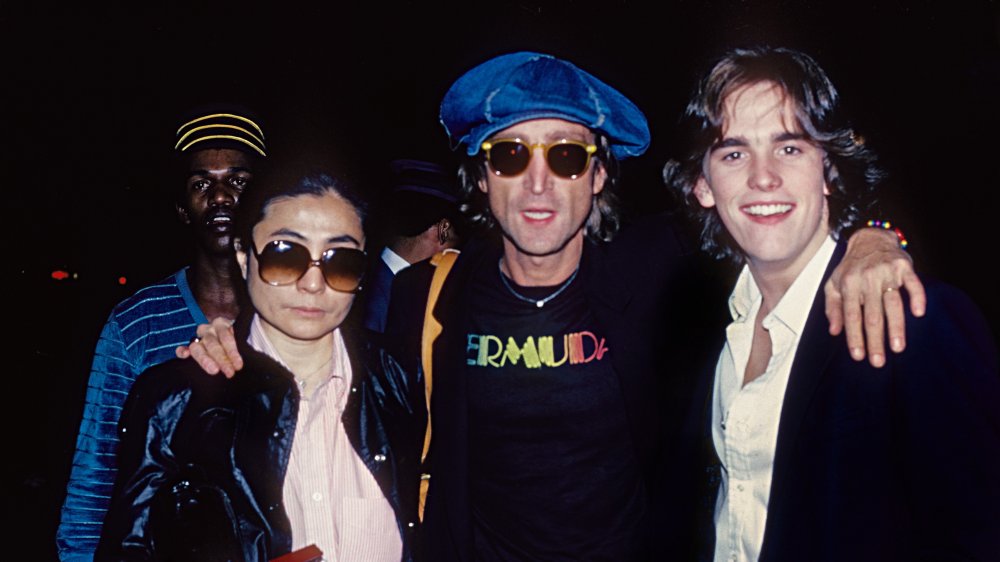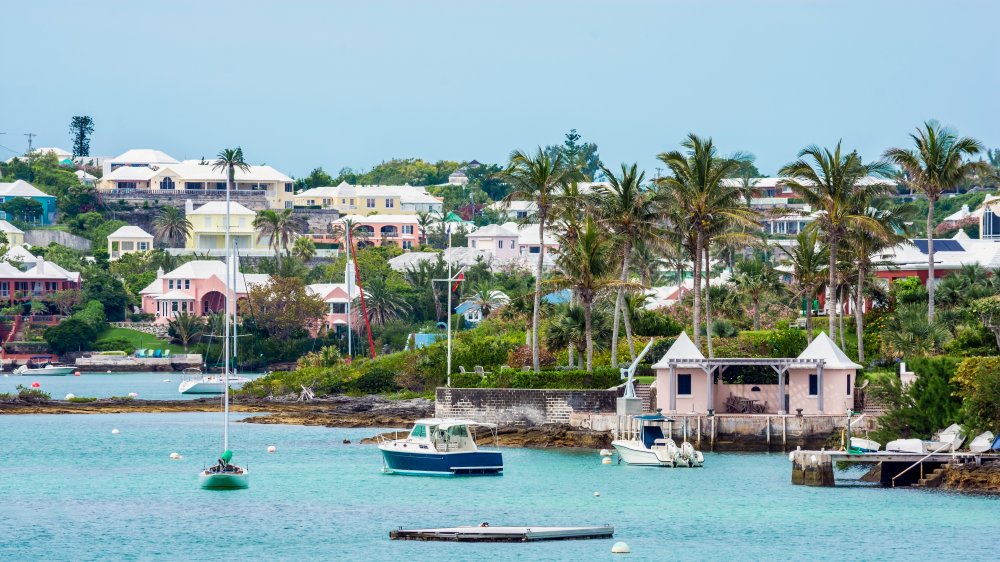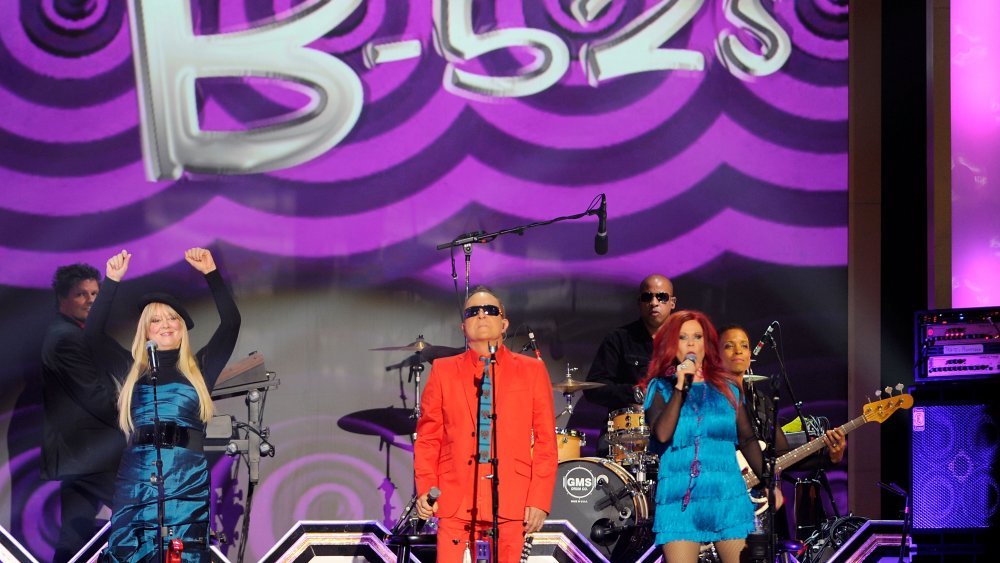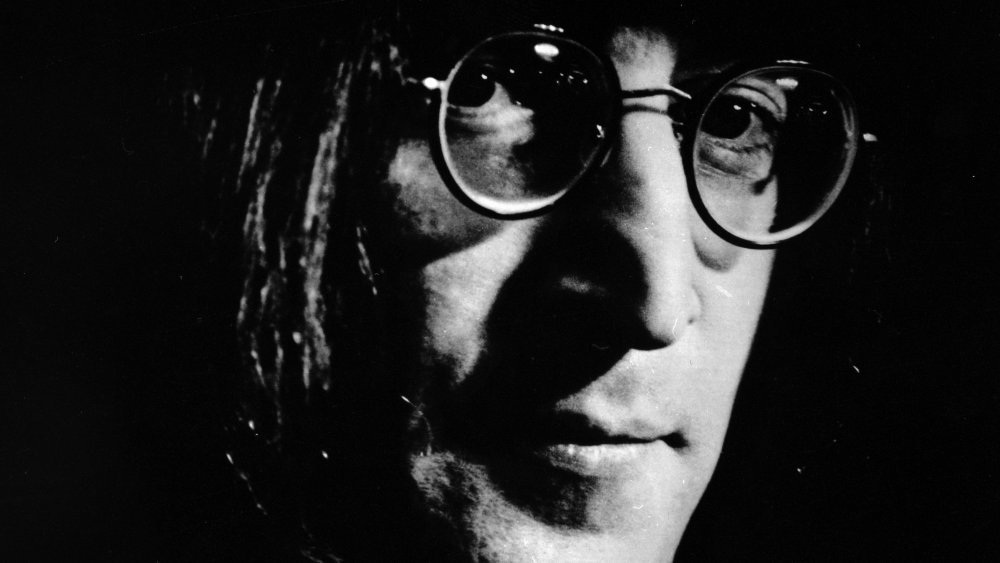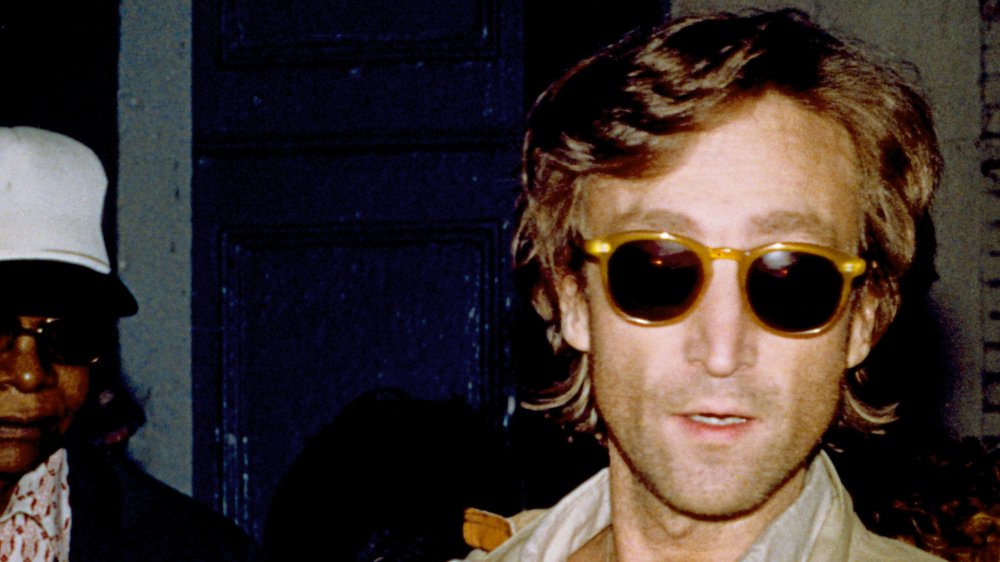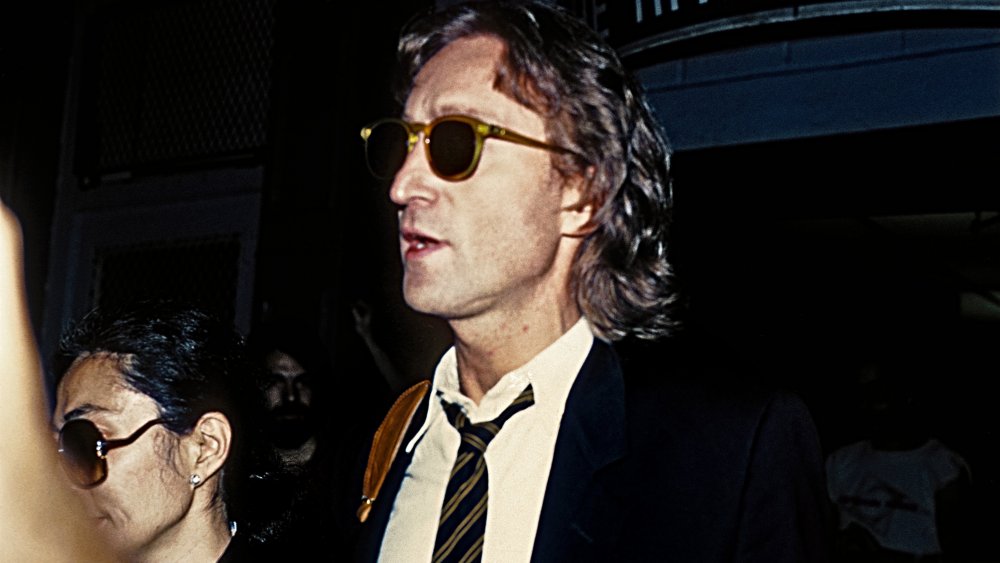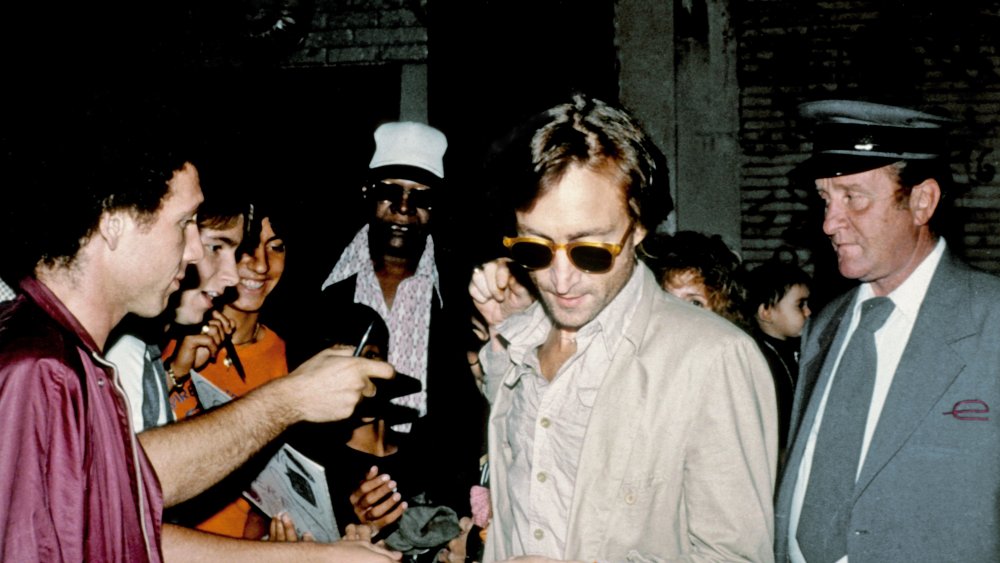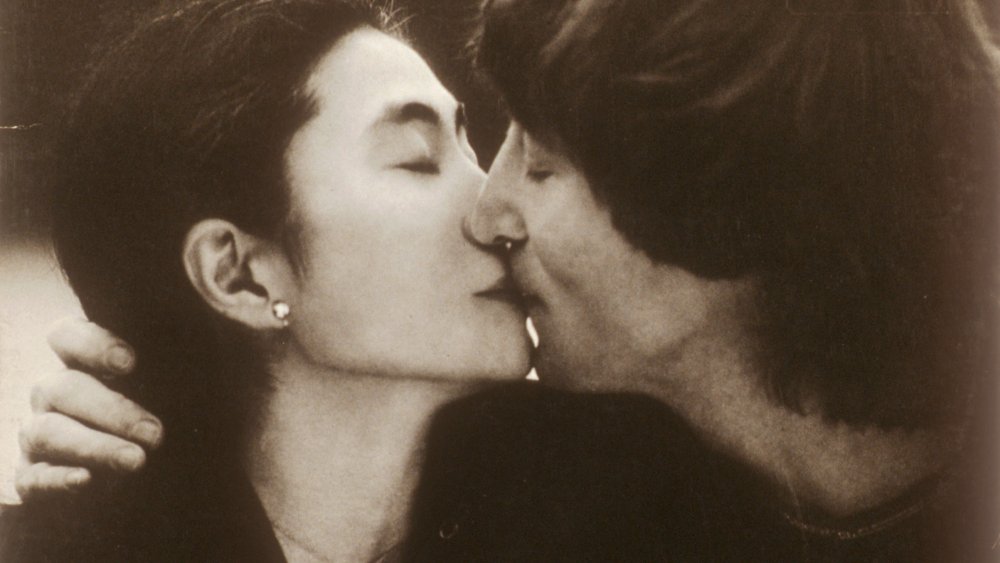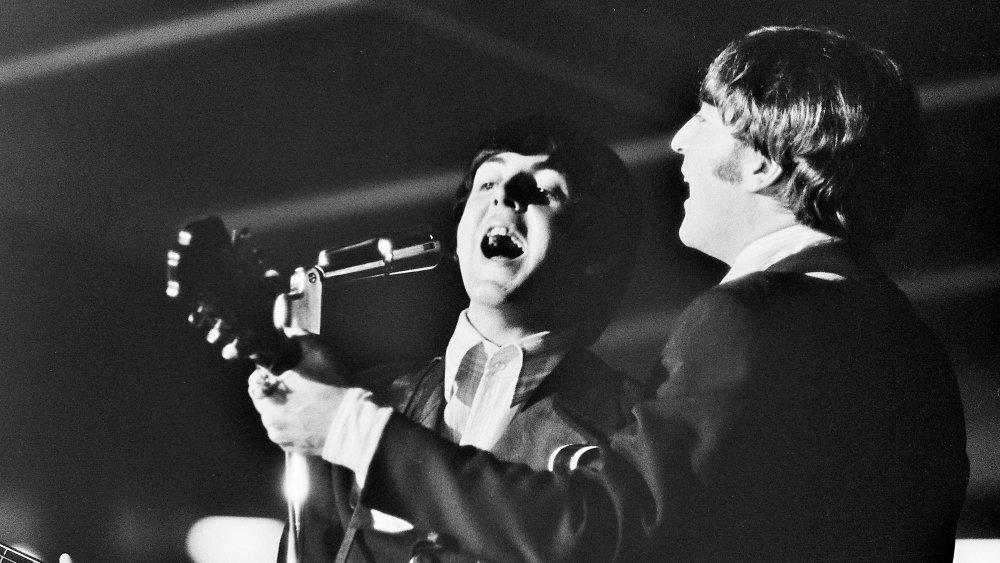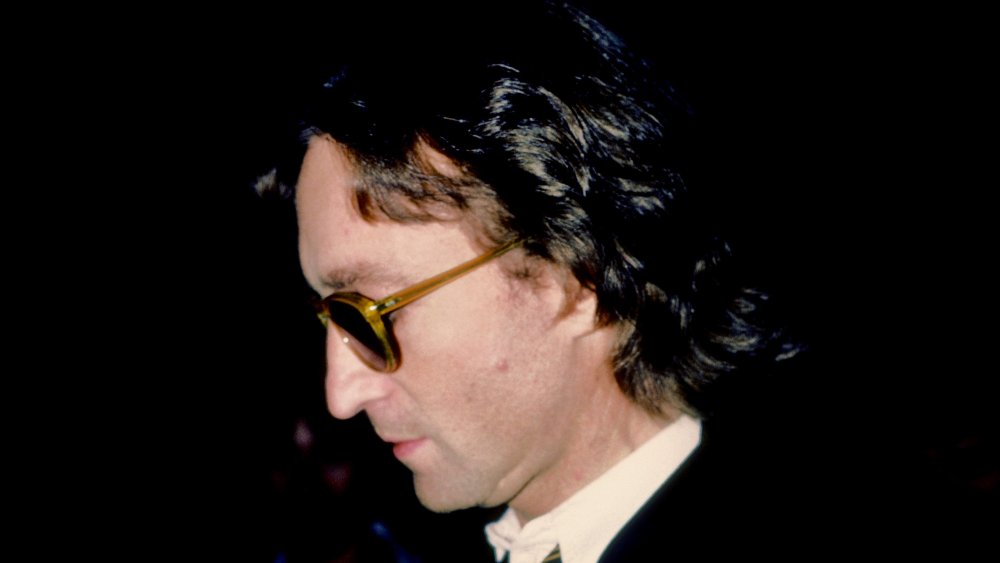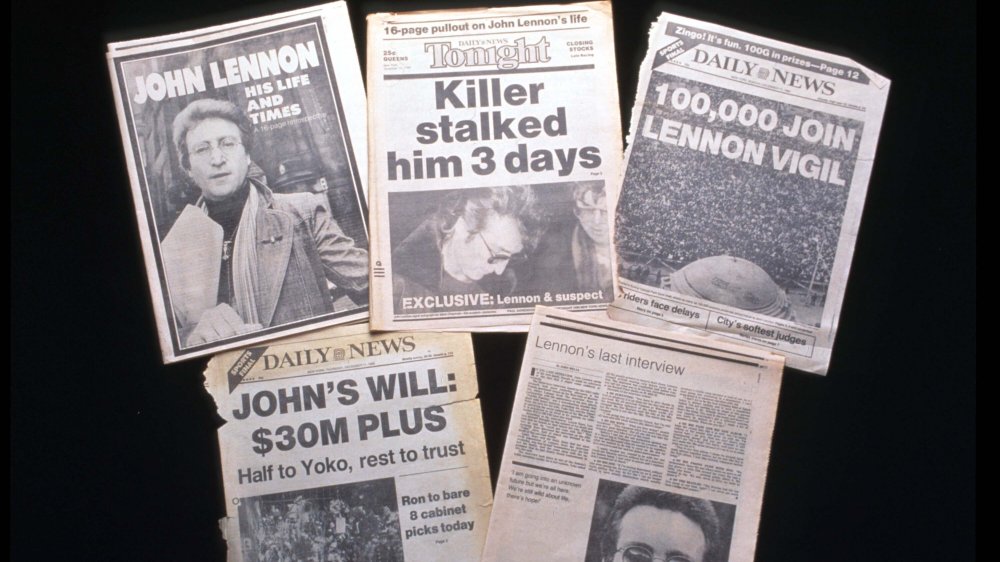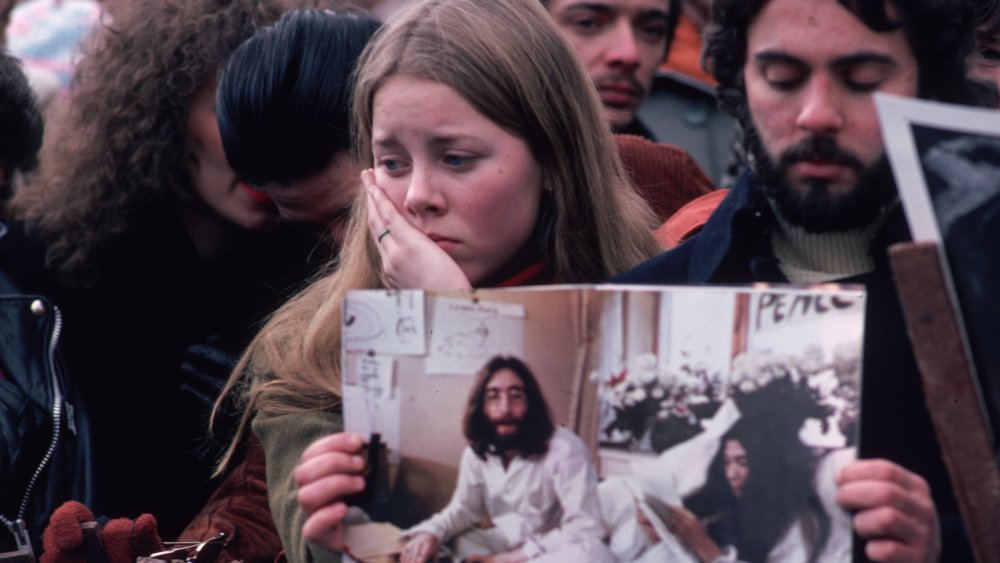What The Final 12 Months Of John Lennon's Life Were Like
The murder of John Lennon in December 1980 at the age of 40 sent shock waves around the world. His death cemented his legacy as a countercultural icon, with a worldwide following of fans who had grown up listening to his music over the previous two decades.
In recent years, the view of John Lennon's life has become increasingly mixed, with his difficult upbringing brought into the spotlight by the hit movie Nowhere Boy, while his behavior toward his wives and children has also come under scrutiny. Indeed, much of this discussion comes from multiple candid interviews that Lennon gave to various publications such as Playboy and Rolling Stone during the final year of his life, which represented his return to public life after a long hiatus, with, as he put it, "something to say."
Lennon's circumstances in 1980 are important in gaining a true perspective on the life of an artist who had a strained relationship with fame and who was a complicated character in general. 1980 is also a crucial year, as it gives an insight into the future of an artist who had emerged from a period of isolation and transformation with a new view of the world, the music industry, and his place in them both.
John Lennon had given up music for five years
In 1975, five tumultuous years after the break-up of the Beatles, Lennon, with his second wife Yoko Ono, withdrew from the public eye, according to Biography. This was to concentrate on raising his second son, Sean. Lennon had made many mistakes in the raising of his first child, Julian, born in 1963 at the height of Beatlemania, meaning that John was often absent and emotionally distant, as interviews from the last year of his life address candidly.
Lennon had worked nonstop throughout his twenties in the Beatles and had claimed that every moment of the band members' lives were planned out for them, especially while they were on the touring circuit. But the early '70s hadn't allowed for much time to slow down, either. Lennon had pursued a successful solo career starting with John Lennon/Plastic Ono Band in 1970. He contributed music to albums by Ringo Starr, collaborated with Elton John in 1974 on "Whatever Gets You Thru The Night," and co-wrote and performed on David Bowie's "Fame" in 1975, according to author David Sheff.
With the birth of Sean, Lennon and Ono withdrew "without any great decision," as Lennon is quoted by David Bennahum, from the music that had dominated his life. He claimed in his final interview with Rolling Stone that he didn't write a single song for five years.
1980 was meant to be John Lennon's comeback
In his return to the limelight in fall of 1980, John Lennon explained that since the birth of Sean, he had taken up the role of "househusband," while also stating in the Playboy interview that: "It was more important to face myself and to face that reality than to continue a life of rock 'n' roll."
The 1970s had been a decade of contrasts for Lennon, the early years of which were characterized by the acrimony of the Beatles splitting and the hedonism of his 18-month-long "lost weekend," during which he and Yoko separated and Lennon joined the ranks of hellraisers Harry Nillson and Keith Moon as a habitual drinker and drug-taker. So Lennon's return in 1980 after five years of domestic normality represented the rebalancing of numerous aspects of his life and his re-emergence to the music industry on his own terms.
Lennon told Playboy: "You breathe in and you breathe out. We feel like doing it and we have something to say," suggesting that he and Yoko felt revitalized and ready to return to public life for the long term.
John Lennon sailed 700 miles to Bermuda
John and Yoko often made decisions using Tarot cards, according to The Telegraph, and one such reading in the spring of 1980 told them that John was to take a long journey southeast. At the time, Lennon, Ono, and Sean were living in Long Island, New York, from which the island of Bermuda lies 700 miles southeast. The family settled on Bermuda as their destination and home for the summer of 1980 — and most notably of all, John and Sean made the journey by sea.
Lennon had been taught to sail by Tyler Coneys in New York, and the two had become friendly enough for Lennon to approach him to put a crew together for his voyage. On the journey, Lennon, as the least experienced sailor, spent much of the time making food for the rest of the crew, but the story goes that after a battering gale had laid many of the more experienced crew down with seasickness, Lennon took the helm, guiding the vessel through the storm. This was reportedly a transformational and cleansing moment for Lennon.
The family encountered a stable and hospitable environment in Bermuda, granting Lennon a degree of comparative anonymity while also allowing him to recapture his creative muse during the two months they remained on the island that summer. It was in Bermuda that Lennon would begin to write his first songs in five years, tragically also the final material of his career.
John Lennon started writing again after hearing the B-52s
The Lennons lived in the suitably named Fairylands area of Bermuda, according to Go To Bermuda, southwest of St. George's Harbor, where their yacht had docked after their difficult journey.
One thing that Lennon's past half-decade had been missing was nightlife, and the songwriter's familiarity with contemporary music had certainly waned during his hiatus. Exploring the nightspots along Front Street in the City of Hamilton, Lennon claims that he stumbled across a young group dancing to music he had never heard before. The song in question was "Rock Lobster" by the B-52s, released in April 1978.
In his final interview with Rolling Stone, Lennon claimed that he had never heard the song before but said that it immediately made him think of Yoko's music. Ono was more familiar than her husband with the movements that had emerged in popular music, from punk to post-punk and new wave, in the late '70s, and the realization that things were changing apparently gave Lennon the inspiration he needed to begin writing music again. He started playing the guitar again the very next day.
Bermuda was John Lennon's first time writing sober
Not only was Bermuda important in the final year of John Lennon's life in that it helped him return to music, but it also, after a long period of creative inactivity, helped him break new ground in his creative process — he was writing music for the first time without the aid of either drugs or alcohol, supposedly for the first time in his adult life. Musicians who worked on the album that Lennon's Bermuda writing sessions subsequently produced, Double Fantasy, recall that by 1980, Brazilian coffee was Lennon's "only remaining drug," according to Record Collector.
One of the songs written in Bermuda addresses this aspect of Lennon's changing habits directly. "Cleanup Time," which would be recorded in the fall of 1980, is, says historian John Blaney, a title derived from a conversation Lennon had with the producer, Jack Douglas, in which the two discussed how many of their friends and acquaintances were attempting to clean up their acts after the excesses of the 1970s. The song contains the lyric: "No rats aboard the magic ship of perfect harmony."
John Lennon wrote 30 new songs in Bermuda
His two-month residence in Bermuda starting in June 1980 has been described as instrumental in Lennon's overcoming of long-term writer's block and the re-emergence of both his creative muse and his interest in writing, recording, and releasing music. There are a number of theories for what exactly it was about the island that had such an effect on Lennon. Some, such as Gentleman's Journal, point to the island's similarities to Britain, noting that, having not visited his home country in nine years, this may have awoken something in Lennon to get his creative juices flowing once more.
As noted by OZY, Lennon later made a direct link between the 30 songs he wrote in the short time he was in Bermuda with the perilous journey there, and particularly with his six-hour manning of the vessel while his crew was out for the count. "I was so tuned in, or whatever, to the cosmos," Lennon later told Playboy, "and all of these songs came." Lennon composed his sketches of songs on an acoustic guitar and recorded the results himself, including material for what would eventually become his final single and album, as well as much more work that would eventually only be released posthumously on 1984's Milk and Honey.
John Lennon returned to New York City and began recording
Lennon came back from Bermuda re-energized and ready to emerge from his self-imposed hiatus. Packing his first collection of new material in half a decade, Lennon began to assemble the team of musicians and producers who would help turn the rough ideas he outlined in Bermuda into studio takes for his return to mainstream music. However, the newly well-balanced Lennon was not out to prove anything, according to Rolling Stone – instead, his attitude was "just to enjoy it."
Studio sessions began at New York's famous Hit Factory studio, with musicians including the legendary guitarist Earl Slick. The sessions also included many songs written by Yoko Ono which she had first shared with John over the phone from New York during his stay in Bermuda (she had returned to the US for three weeks to take care of the family's business affairs), and many of the songs initially emerged from this "call-and-response" routine between the couple, according to Record Collector.
In October, John Lennon released (Just Like) Starting Over
The nature of Lennon's comeback was writ large in the title of his first single in five years. "(Just Like) Starting Over" is a sweet single that adequately reflects the unity of his relationship with Ono in the years preceding its release, with the opening bars especially evoking the theme of rebirth and the trepidation of returning to something — the music scene — which is no longer quite so familiar as it once was.
The song is, in fact, constructed from three fragments, says Beatles Bible, with the first section, originally titled "My Life," emerging in embryonic form in 1979 as a love song that John had penned for Yoko. Two unfinished pieces, previously known as "Don't Be Crazy" and "The Worst Is Over" make up the remaining parts, while the song only came together in its final form once Lennon and Ono had begun working in the studio in New York.
On release, the single peaked in the Top 10 in both the UK and the US singles charts, marking an end to Lennon's self-imposed hiatus and signaling that he still had a receptive — though tentative — following as an artist. The single was to become his biggest solo hit in the US after his death.
John and Yoko released Double Fantasy
The studio sessions in New York yielded an album within two months — the same period of time that Lennon had spent rediscovering his creative energies on the island of Bermuda. Double Fantasy, released November 17, 1980, echoed the structure of how the songs were first written and shared between John and Yoko, in which a song sung by one of them would influence the other to respond with another song. So in the track listing, you have Lennon singing "I'm Losing You," to which Ono responds with the song "I'm Moving On."
Despite such tensions providing much of the drama of the album, the lyrics are permeated with images of domesticity and marital bliss -– which many reviewers at the time took issue with, as Ultimate Classic Rock notes. In fact, the response to the album upon its release was, to put it mildly, mixed, with the record's domestic themes and Lennon's apparent happiness being bones of contention for many critics. In hindsight, however, these revealing elements have come to show Lennon's state of mind in his final days, and tragically, Double Fantasy seems to suggest that by 1980, Lennon may have finally begun to find balance between public and private life and, with it, happiness.
John Lennon and Paul McCartney were on good terms in 1980
From the breakup of the Beatles in 1970, John Lennon and Paul McCartney had had a tense and rocky relationship, beginning with the two taking shots at one another on records and in numerous early solo interviews. Lennon had taken issue with some of the lyrics on Paul and Linda McCartney's 1971 album Ram, which he interpreted as being about his relationship with Yoko Ono. McCartney would later confirm to Playboy that the song "Too Many People" was indeed about John and Yoko and that the latter's name was in the original lyrics before being edited out. On John's side, the vicious "How Do You Sleep?" from Imagine, released the same year as Ram, could hardly be about anyone else.
By the mid- to late '70s, however, the duo had begun to mend their friendship. According to Huffpost, the pair had reunited only a couple of times since — once in 1974 during the "Lost Weekend" and again in 1976, when they spent an evening together watching an episode of Saturday Night Live in which Lorne Michaels jokingly offered the Beatles $3,000 to appear on the show. The two joked about turning up at the studio.
Lennon and McCartney last spoke on John Lennon's 40th birthday, October 9, 1980, a phone call that McCartney later described as "happy." On the day of his death two months later, Lennon reportedly told journalist Dave Sholin that McCartney was "like a brother."
John Lennon was interviewed for nine hours days before his death
It seems that John Lennon's claim that he and Yoko Ono had "something to say" on their return wasn't just empty rhetoric. If anything, it was as if the well of words had refilled itself in the years that Lennon had been away from the spotlight. In addition to the songs and musical ideas, the claim that Lennon had rediscovered his voice in Bermuda is also evidenced by the slew of interviews and public appearances that Lennon made in the months before his death.
In September, the couple gave a long interview to Playboy that covered all aspects of their careers, from the early days to what their working routines were like in 1980, as well as their family life and opinions about Lennon's former bandmates and contemporaries.
On Friday, December 5, 1980, three days before his murder, Lennon was interviewed at his Upper West Side apartment by Rolling Stone editor Jonathan Cott for a full nine hours. The interview was only published years later — instead, Cott wrote Lennon's obituary, drawing on impressions of the musician from over a decade of wide-ranging interviews and meetings. Lennon's final interview is impactful today as an encyclopedic insight into his life in 1980 and his potential future, had the worst not occurred just days later. Lennon was undertaking another lengthy interview, with journalist Dave Sholin, on the day his killer struck.
John Lennon was shot and killed in New York on December 8, 1980
The horror of Lennon's murder — committed publicly, in front of his wife, by an obsessive fan who he 'd spoken to and signed a record for earlier the same day — requires no detailed explanation. The tragedy of his death at the age of 40 in light of what we know about his life immediately beforehand is, however, worth thinking about.
Biography describes how Lennon was publicly active, promoting a new album, meeting fans, and returning to the studio to work on more music when his life was taken from him. Having taken steps to address aspects of his life, his past behaviors, and his turn away from music in favor of family, the truth is that perhaps, as his many interviews in 1980 show, Lennon's life was — possibly for the first time — perfectly balanced, and he was approaching music and fame on his own terms. And the peaceful space that he had created for himself and his family in his hiatus allowed him to think about his future, a far cry from the Beatlemania days when life was moving fast at the behest of managers and executives. As he said in his September 1980 Playboy interview: "God willing, there are another 40 years of productivity to go."
Double Fantasy won Album of the Year at the Grammys
The outpouring of grief following Lennon's murder sent his final album multiplatinum, and it eventually won the Grammy award for Album of the Year, according to Ultimate Classic Rock. Lennon's death meant that the album's intimate themes and lyrics became insights into his final months, while for many, the Grammy that the album received stands as a memorial to an artist who just wanted to keep creating. "(Just Like) Starting Over" hit #1 in both the UK and US after his death, staying at the top of the Billboard 100 for five weeks.
According to The Independent, the album gets its title from a species of Freesia flower found in the Botanical Gardens of Bermuda — where Lennon spent his final summer with Yoko and Sean. Lennon told Rolling Stone: "What it means to us is that if two people picture the same image at the same time, that's the secret."
